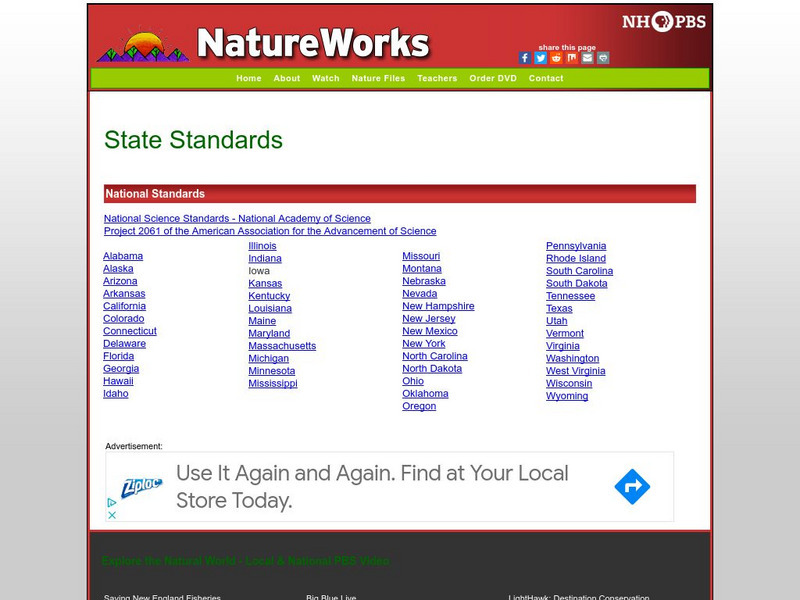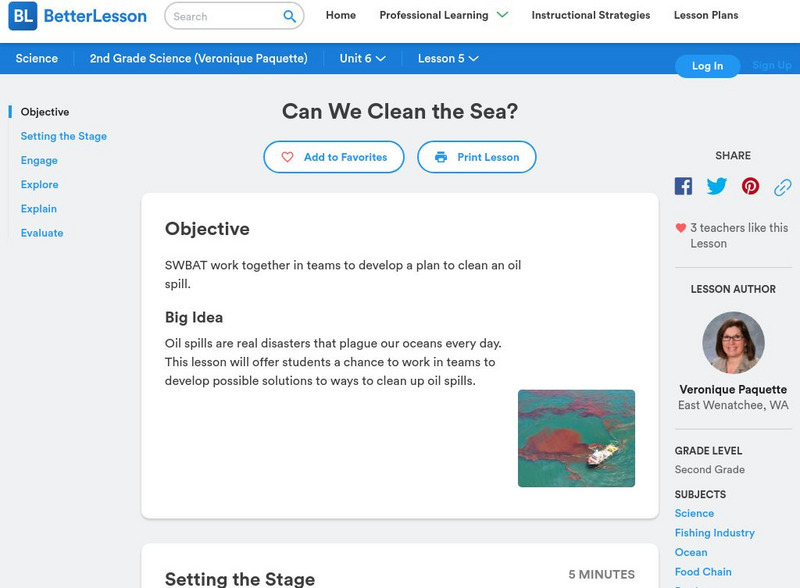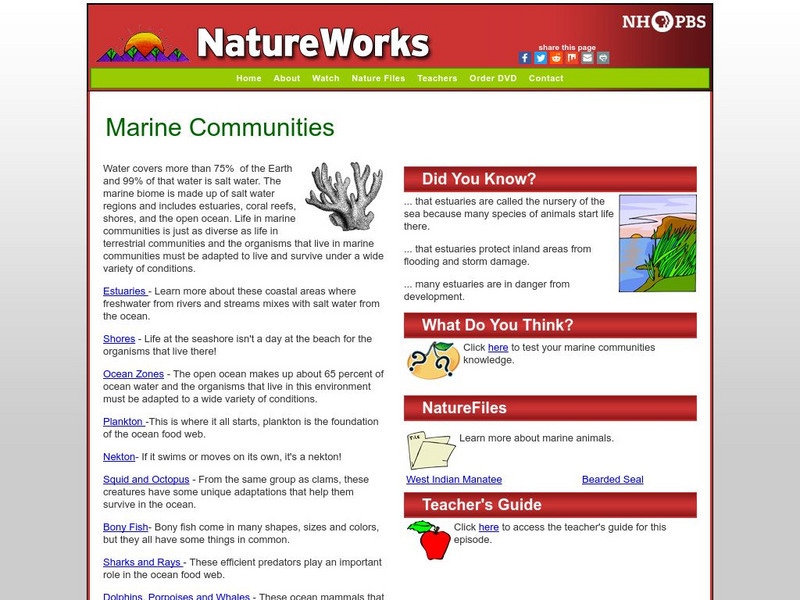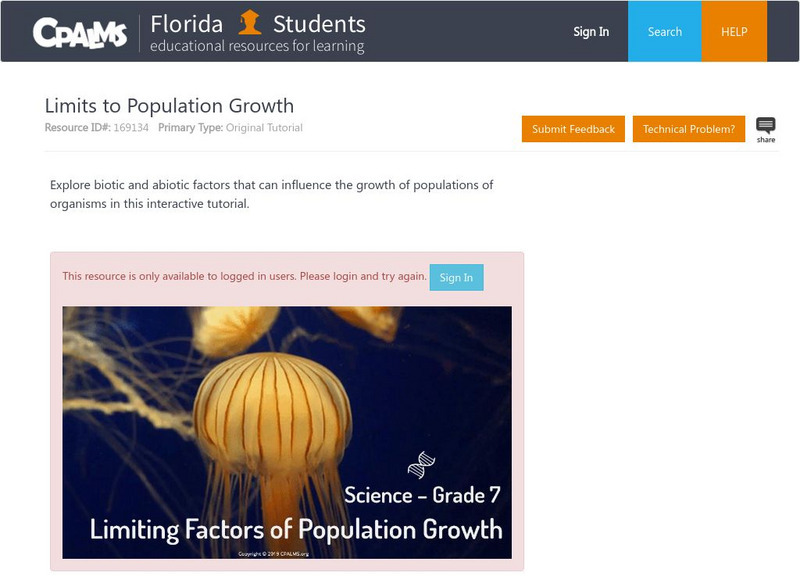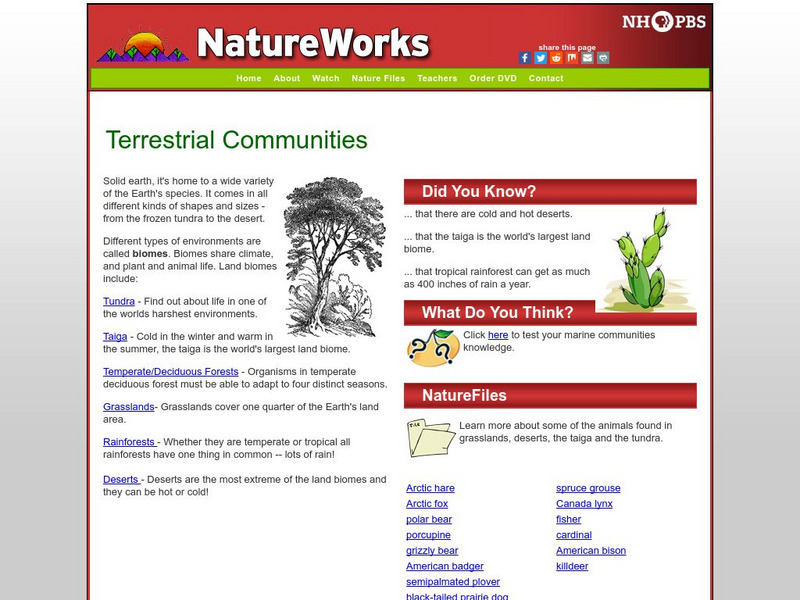American Museum of Natural History
American Museum of Natural History: O Logy: Stuff to Do: Web of Life Game
Fun, interactive game that helps students identify interrelationships in an ecosystem. For six or more players.
Concord Consortium
Concord Consortium: Stem Resources: Competition
An interactive activity where students study how two species of producers are affected by a consumer. By completing several virtual experiments and collecting data, students will be able to summarize what plants can do to defend...
Concord Consortium
Concord Consortium: Dam Building: How Changes in Environment Affect Population
In this simulation, students build a dam in the middle of a field, dividing an ecosystem in half to illustrate the effects of environmental changes. They watch and collect data as the grass and then the rabbit populations in that region...
That Quiz
That Quiz: Biotic or Abiotic? Living or Non Living?
This fun quiz has you choose between different images to decide whether it is biotic or abiotic. It also gives examples through illustrations of abiotic and biotic things.
PBS
Nh Pbs: Nature Works: Teacher's Guides
A wealth of resources connected to individual nature-related state standards can be found here. Information in a newsletter-type format is located under particular grade levels and is accompanied by teacher guides and short quizzes to...
Better Lesson
Better Lesson: Can We Clean the Sea?
Oil spills are real disasters that plague our oceans every day. This lesson will offer students a chance to work in teams to develop possible solutions to ways to clean up oil spills.
PBS
Nh Pbs: Nature Works: Marine Communities
Explore saltwater ecosystems around Earth. Learn about oceans, estuaries, shores, and more.
Project Britain
Primary Homework Help: Food Chains Quiz
Brush up on food chain vocabulary before taking this interactive quiz. Check the box for the correct answers throughout the assessment.
E-learning for Kids
E Learning for Kids: Nova Zembla: How Does Temperature Affect Plant Growth?
Viktor brought his pet plant on his trip to Nova Zembla. Help him figure out what to do to take care of the plant.
Concord Consortium
Concord Consortium: Stem Resources: Variations and Adaptations
Experiment with variations in grass to see which size grows best with different amounts of water. Understand that grass that can live in different levels and change to its environment has a better chance of surviving. Also, experiment...
National Geographic
National Geographic: Human Impact on the Cloud Forest
A study discovering and exploring the cloud forest canopy and how humans have influenced the ecosystem's biodiversity.
PBS
Pbs Kids: Mountain Scramble
Build a mountain ecosystem by adding appropriate plants and animals, and by keeping the ecosystem in balance. Be sure every species has enough to eat to survive.
CPALMS
Florida State University Cpalms: Florida Students: Limits to Population Growth
Explore biotic and abiotic factors that can influence the growth of populations of organisms in this interactive tutorial.
PBS
Nh Pbs: Nature Works: Temperate Deciduous Forests
NatureWorks offers some fascinating information about the Temperate Deciduous Forests. Students and teachers will learn what makes these forests special, what animals live in this biome, what plants grow in this biome, and more.
PBS
Nh Pbs: Nature Works: Terrestrial Communities
Explore land ecosystems around Earth. Learn about forests, tundra, taiga, grasslands, and deserts.
Other
Importance of Plants and Plant Communities
Discover why plants are extremely important to humans. Resource provides an explanation of the important things they provide.
Untamed Science
Untamed Science: Biomes of the World
Investigate the climate zones and biomes of the world.
Geography 4 kids
Geography4 kids.com: Types of Climates
Discover a few types of climates found on the earth like rain forests and deserts.
Climate Literacy
Clean: Climate Change on the Antarctic Peninsula
In this cross-curriculum inquiry, young scholars use a cooperative approach to investigate the effect of climate change on the ecosystem of the Antarctic Peninsula. The activity stresses the importance of evidence in the formulation of...
CK-12 Foundation
Ck 12: Biology: Organization of Living Things
[Free Registration/Login may be required to access all resource tools.] How organisms are organized.
American Geosciences Institute
American Geosciences Institute: Earth Science Week: Hands on Experiments to Test for Acid Mine Drainage
Fifteen short experiments which test acid mine damage to the streams, rivers, and creek ecosystems surrounding it.
E-learning for Kids
E Learning for Kids: Science: Hawaii: What Can We Find in a Garden?
Daisy is learning all about the animals and plants that live in her beautiful garden. Join her and learn about habitats, too.
CPALMS
Cpalms: Life on Mars [Pdf]
An informational text about people planning a one-way trip to Mars. A question sheet is available to help students build skills in reading comprehension.
Alabama Learning Exchange
Alex: From Weeds to Worms
The purpose of this lesson is to guide students in researching and discovering the importance of the interdependence of living and nonliving things in an ecosystem. Students utilize technology independently and cooperatively to establish...






